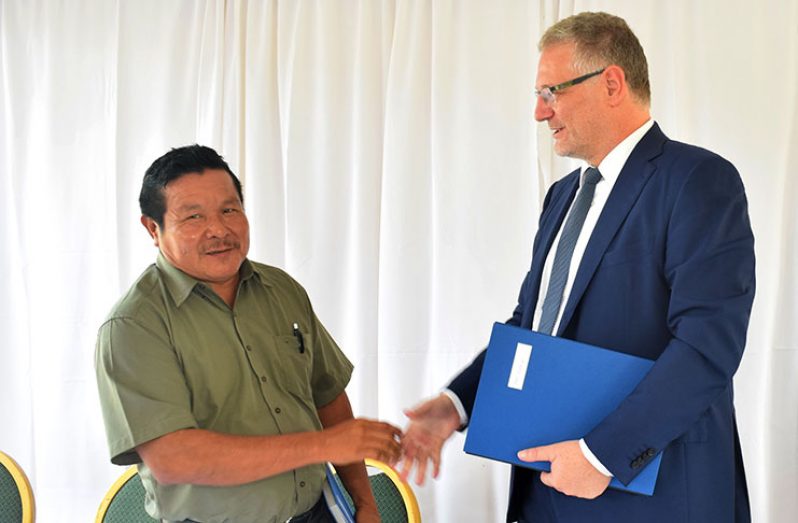CAPACITY-BUILDING for indigenous village leaders is expected to be one of several initiatives which the Amerindian People’s Association (APA) plans to undertake with the aim of improving self-governance within the villages.This is one of a list of components of the APA programme agenda, which was mentioned on Wednesday at the Promenade Gardens when the APA and its partner, the Forest People’s Programme (FPP), signed onto an agreement with the European Union (EU).
The EU has committed to funding a G$94.5M project in which the APA and the FPP will undertake initiatives aimed at promoting equal rights and the fight against discrimination, as well as the protection of indigenous people’s rights in Guyana.
At the forum, EU Ambassador to Guyana, Jernej Videtic, stressed the importance which the body places on its support for civil society here.
Speaking at the forum, APA leader, Mario Hastings, told the gathering, which included civil society representatives and members of the diplomatic corps, that the funding will be utilised to cover a range of project components.
These include amendments to the contentious Amerindian Act of 2006; inputs of indigenous peoples into policies and programmes affecting them, such as land-titling matters and the implementation of “Green” initiatives. In addition, another project which will be covered by the funding is the negotiation of settlements in several cases, such as the matter which involves the Mazaruni village of Isseneru. Hastings noted that the issue is currently before the Inter- American Commission on Human Rights.
He noted too, that capacity-building training for indigenous leaders, which is geared to ensure the village leaders have an increased understanding of human rights, norms and relations to national law and policy, will also be undertaken through the funds provided.
On this note, Hastings said that the assistance should see villages develop rules in addition to those which exist and according to him, the expected result would see communities being better positioned to utilise their “powers of self-government, addressing issues of importance or concerns.”
He said that the project comes at a very opportune time when, according to him, the APNU+AFC government has publicly committed to “correct the serious deficiency in law and practice that currently discriminate against indigenous people.”
Indigenous body receives EU funding -capacity-building among projects targeted
SHARE THIS ARTICLE :
Facebook
Twitter
WhatsApp



.jpg)








